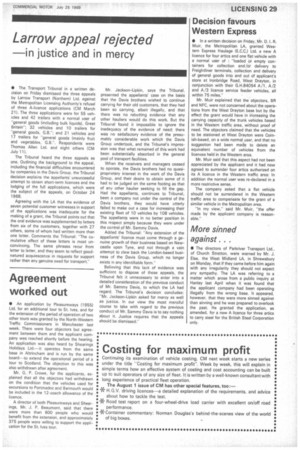Larrow appeal rejected
Page 31

If you've noticed an error in this article please click here to report it so we can fix it.
in justice and in mercy
• The Transport Tribunal in a written decision on Friday dismissed the three appeals by Larrow Transport (Northern) Ltd. against the Metropolitan Licensing Authority's refusal of three A-licence applications (CM March 21). The three applications were for 55 vehicles and 42 trailers with a normal user of "general goods (including bulk liquids), Great Britain"; 32 vehicles and 10 trailers for "general goods, GB.': and 21 vehicles and 17 trailers for "general goods (mainly fruit and vegetables, &B.". Respondents were Thomas Allen Ltd. and eight others (CM July 11).
The Tribunal heard the three appeals as one. Outlining the background to the appeal, including the financial difficulties encountered by companies in the Davis Group. the Tribunal decision explains the appellants unsuccessful attempt to obtain short-term licences and the lodging of the full applications, which were the subject of the appeals, on October 24 1968.
Agreeing with the LA that the evidence of seven potential customer witnesses in support of the applications was inadequate for the making of a grant, the Tribunal points out that the oral evidence was supplemented by letters from six of the customers, together with 27 others, some of whom had written more than one letter. Comments the Tribunal: "The cumulative effect of these letters is most unconvincing. The same phrases recur from letter to letter, and they seem to reflect goodnatured acquiescence in requests for support rather than any genuine need for transport." Mr. Jackson-Lipkin, says the Tribunal, presented the appellants' case on the basis that the Davis brothers wished to continue carrying for their old customers, that they had been so carrying, albeit illegally, and that there was no rebutting evidence that any other hauliers would do this work. But the Tribunal found it impossible to ignore the inadequacy of the evidence of need; there was no satisfactory evidence of the presumably considerable work which the Davis Group undertook, and the Tribunal's impression was that what remained of this work had been substantially absorbed in the general pool of transport facilities.
When the receivers and managers ceased to operate, the Davis brothers had no quasiproprietary interest in the work of the Davis Group, and their desire to obtain some of it had to be judged on the same footing as that of any other haulier seeking to fill the gap. Had the appellants, continues to Tribunal, been a company not under the control of the Davis brothers, they would have utterly failed to make out a case for increasing their existing fleet of 10 vehicles by 108 vehicles. The appellants were in no better position in this respect simply because they were under the control of Mr. Sammy Davis.
Added the Tribunal: "Any extension of the appellants' licence must come through a genuine growth of their business based on Newcastle upon Tyne, and not through a vain attempt to claw back the London-based business of the Davis Group, which no longer exists in any identifiable form."
Believing that this lack of evidence was sufficient to dispose of these appeals, the Tribunal felt it unnecessary to enter into a detailed consideration of the previous conduct of Mr. Sammy Davis, to which the LA had regard. The Tribunal's decision concludes: "Mr. Jackson-Lipkin asked for mercy as well as justice. In our view the most merciful course to take with regard to the previous conduct of Mr. Sammy Davis is to say nothing about it. Justice requires that the appeals should be dismissed:"
















































































































